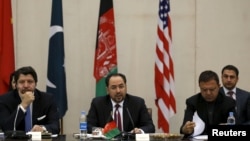Afghanistan on Monday hosted a meeting of delegates from the United States, China and Pakistan on how to initiate direct peace talks between Afghan government and Taliban representatives.
A joint statement issued after the meeting in Kabul of the so-called Quadrilateral Coordination Group (QCG) said, “The group discussed and made progress on a roadmap towards initiating peace talks with Taliban groups that reflects the shared commitments of the QCG member countries.”
The roadmap, it added, aims to set specific measures that are necessary for creating a conducive environment for the commencement of Afghan-led, Afghan-owned peace talks to reduce and ultimately end “the senseless violence” and establish lasting peace in Afghanistan.
The four-nation contact group has agreed to hold its next meeting in Islamabad on February 6.
Monday’s was the second meeting of the QCG – formed to help bring an end to the war in Afghanistan after Islamabad hosted initial discussions last week.
“…the QCG called on all Taliban groups to enter into early talks with the Afghan government to resolve all differences politically in accordance with the will and aspirations of the entire Afghan nation and the desire and support of the QCG member countries for lasting peace in Afghanistan,” according to the joint statement
The statement went on to assert that participants indicated their commitment to “a robust effort” to eliminate all forms of terrorist groups, regardless of their national origin, operating in their respective territories.
Member countries agreed that friendly, mutually respectful and cooperative relations among the member states of QCG are necessary to create an enabling environment for the peace process in Afghanistan.
Earlier in his inaugural remarks to the meeting, Afghan Foreign Minister Salahuddin Rabbani emphasized the need for “red lines” for an effective road map to peace in Afghanistan.
Hinting at the need for reduction in violence in Afghanistan by the Taliban groups, Rabbani reiterated that the Afghan public would not support an “open-ended process without tangible results.”
'Call for peace'
Rabbani also called on all Taliban groups to “accept our call for peace through dialogue.” So far none of the Taliban groups has indicated a willingness to engage in the process.
An earlier round of peace talks with the Taliban in July stalled after indicationst that its leader, Mullah Omar, had died. Their new leader, Mullah Akhtar Mansoor, faced internal challenges to his authority, leading to an increase in violence in Afghanistan.
The Afghan government expects Pakistan to use its influence with Taliban groups, whose leaders are reportedly in Pakistan, to bring the level of violence down, and to use force against groups that refuse to come to the table for negotiations.
Pakistan says its influence with the Taliban is “limited” and the use of force would be counterproductive until all other measures have been exhausted.
“Threat of the use of military action against irreconcilables [those unwilling to talk] cannot precede the offer of talks to all the groups and their response to such offers,” said Sartaj Aziz, adviser to Pakistan’s prime minister on foreign affairs, in his opening statement to the first QCG meeting.
Trust deficit
The presence of the United States and China in the process is supposed to help with the trust deficit between Afghanistan and Pakistan.
The Taliban, however, controls more territory today in Afghanistan than it did anytime after it was ousted from power in 2001.
This makes it more difficult to persuade the Taliban to enter peace negotiations with an Afghan government that seems to be on the defensive.
Messages left by Taliban leaders on their websites or social media accounts had called last week’s QCG meeting “useless.”
On the eve of the latest round of discussions, the Taliban accused the U.S. of derailing peace efforts by re-engaging combat troops in Helmand.
Taliban demands
The Taliban also insisted that nothing less than the withdrawal of all foreign forces and implementation of Sharia, or Islamic law, will be acceptable to it.
The Taliban also has recently started calling President Ashraf Ghani’s government a “stooge” of the U.S.
This is a return to the Taliban's position during the time of former Afghan president Hamid Karzai and can be termed a hardening of its stance against the current government.




